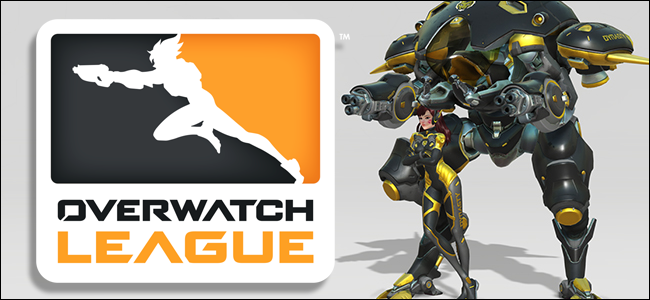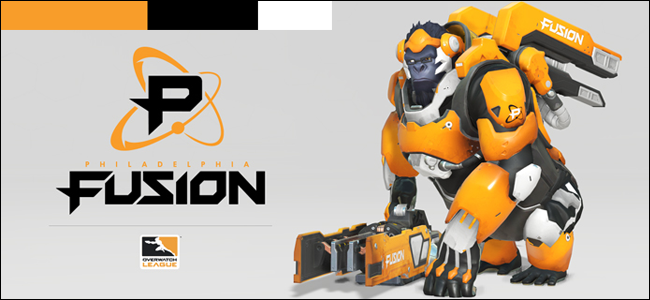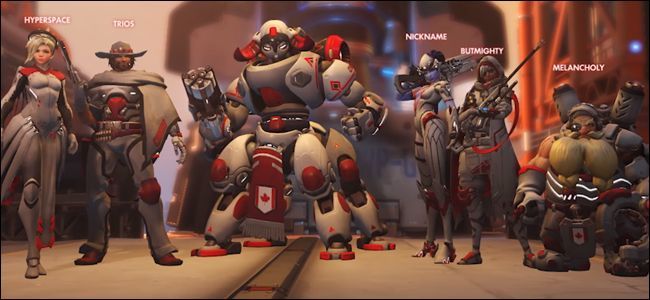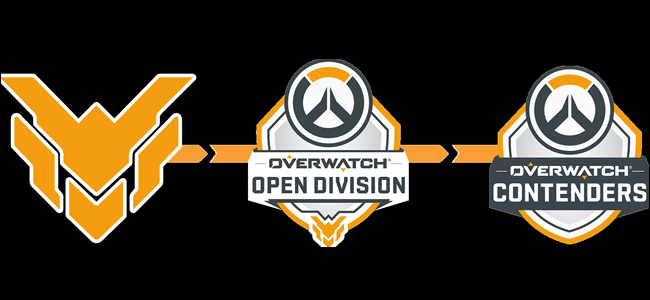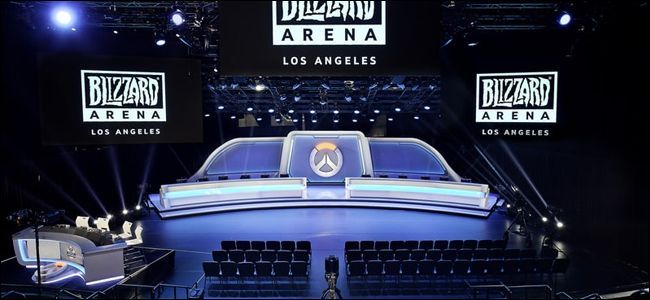Quick Links
eSports, the colloquial and irritating name for organized tournaments featuring multiplayer PC and console games, are all the rage these days...among geeks. But because of their decidedly geeky roots, there seems to be a limited appeal for general audiences: you're unlikely to tune into the DOTA International if you've never played a round of the game itself.
Blizzard is hoping to make the appeal of eSports much broader, and its methods for doing so are interesting...and not because they're particularly new. The competitive league being created for the team-based shooter Overwatch is leaning on the pillars of conventional pro sports like baseball, football, and soccer, hoping to attract the eye of old-fashioned sports fans and newbie gamers alike. Here's how.
Teams Based On Cities, Not Sponsors
Before now, team-based eSports have been filled with teams with names and designs that leaned on either online gamer culture (Evil Geniuses, Team EnVyUs, FaZe Clan) or simply named after their sponsors, like the Samsung Galaxy or SK Telecom. And it's easy enough for fans of eSports to follow their favorite team, but it's hard to imagine watercooler talk about Team Virtus.pro's big win over CDEC last night.
Enter Blizzard's city-based approach. The Overwatch League currently has twelve teams on the schedule for its inaugural season next year, all brand new, though some are owned by the owners and managers of existing major eSports teams. They are:
- The Boston Uprising
- The Dallas Fuel
- The Houston Outlaws
- The London Spitfire
- The Los Angeles Valliant
- The New York Excelsior
- The Philadelphia Fusion
- The San Francisco Shock
- The Seoul Dynasty
- The Shanghai Dragons
- Two as-yet unnamed teams based in Los Angeles and Florida
Note how the locations and dynamic names of the teams sound like something you'd expect in a conventional sports league. If I told you that the teams above were AAA baseball teams or women's rugby teams, you wouldn't bat an eye. That's part of Blizzard's overall strategy: make it as easy as possible for fans of conventional sports to transition to watching eSports.
Blizzard's not the only one taking notice. While most of those teams are owned by the owners and financeers of existing major eSports teams, a few heavy-hitters from conventional sports are getting in on the action. The owners of the New England Patriots, Los Angeles Rams, Arsenal Football Club, and New York Mets have all invested into the Overwatch League with teams in their corresponding cities.
The teams will have standard partnerships and sponsorships with major brands, but the identity and branding of the teams will focus on specific cities and regions, just like pro sports teams around the world. That's a big and very intentional difference from the more or less independent organization of eSports as it is now. It's an important distinction: you're more likely to take a friend to see "The LA Valiant play the Houston Outlaws" than to see "Counter Logic Gaming versus Newbee." Associating teams with cities also gives people a reason to cheer for one over the other, even if they're completely unfamiliar with the players (or even the game itself).
Graphics and Design Based on Conventional Sports
We're still months away from the first pre-season matches of the Overwatch League, but Blizzard has started posting the initial graphics and logos for some of the teams on its official site. Check 'em out:
Once again, we can see that Blizzard and its partners are drawing on conventional sports themes to give its new League mass appeal. The logos and typography match the style of modern sports logos, with dynamic lines and contrasting colors. Even the names are tied to their city's history and culture where possible: the London Spitfire is named after the iconic RAF fighter plane flown in World War II.
The sports team appeal doesn't stop there. Blizzard is making custom skins for each team, applying them all to each Overwatch playable character. This serves two purposes. One, it will make individual games easier to watch with player easily distinguished between teams, just like real pro sports. Contrast this with the relative chaos of the average MOBA competition, and it's easy to see why Blizzard wants even its digital characters to suit up in virtual team colors. Games will even follow the NFL's guidelines for home and away uniforms: "home" city teams will be in primarily black or dark variants with "visiting" teams in white or bright colors. Even special effects, bullet tracers, and weapon effects will be color coded for teams. "We want to make it super-obvious that you know which team you're watching and which player you're watching at all times," said Overwatch game director Jeff Kaplan.
The second purpose is, of course, merchandising. You can bet that Blizzard and its team partners will be using those uniforms to sell jerseys and other real-world goods, and possibly even team-branded skins for regular players to use in casual matches. With twelve teams, each with home and away color schemes, Blizzard will be making no less than six hundred hero skins for its Overwatch characters. You can bet that there's already a plan in place to monetize each and every one. The potential for branded sales, both real-world and digital, goes far beyond the clumsy eSports and "pro gamer" labeling we've seen thus far.
Contracts Rules for Teams and Players
While owners get a fair amount of leeway in recruiting and maintaining their teams, Blizzard has put in some admiral minimums for competitors in its official league. Those include a minimum age of 18, a minimum yearly salary of $50,000 USD (or the equivalent in foreign currency), full medical insurance, and free housing during the season. That's some serious dough just for being on a team roster---most eSports competitors play almost exclusively for winnings, with the best teams offering a smaller salary. (Winners in the Overwatch League will also keep at least half of the prize money from the $3.5 million prize pool.)
To put it bluntly, you could play hard, practice, secure a spot on a pro Overwatch team, and treat it like a real job. Hell, by any reasonable definition, it is a real job: $50,000 is about 40% above the average single income in the United States. Throw in insurance, comped travel, and extra income from winnings, and Blizzard's organized approach to eSports makes it seem more like conventional sports leagues and less like the winner-take-all approach we've seen thus far.
Feeder Leagues Built Into the Main Game
Pro sports have minor leagues, independent and sponsored teams made up of less talented and up-and-coming players that aren't quite ready for the majors, but can be called up any time. Overwatch is getting something similar. In addition to the ranked mode in the PC and console game (which has no stakes except bragging rights on the leaderboard), there's a minor league called Overwatch Contenders that plays on a smaller stage. Sixteen teams play the initial round of the tournament online, opening up the competition to more or less everyone (at least everyone who meets the over-18 eligibility requirements). The final two stages, featuring the top four teams, will happen in offline events, with a price pool of $100,000.
Contenders allows for players who want to go pro a chance to get in on the action with more or less zero investment, and owners and recruiters in the big league to easily find players with the skills and teamwork to rise up to the top.
Deidcated eSports Venues
Everybody knows you can't be a real sport without ridiculously exorbitant dedicated venues. Blizzard has that covered: it opened Blizzard Arena Los Angeles last month. While the building's capacity isn't anywhere near even the smallest stadiums, the former stage used by The Tonight Show has been renovated from the ground up to support the unique needs of eSports. For example, the two teams are flanked by the gigantic movie theater-style screens where the main action takes place, and the announcer and color commentator sit in an illuminated soundstage visible to the crowd.
Blizzard isn't the only one investing in dedicated pro gaming spaces. eSports Arena is an independent corporation hosting competitions in custom-built locations in California and Las Vegas. With city-based teams popping up in the US, UK, China, and South Korea, you can bet Blizzard will encourage them to either build their own "home stadiums" or rent out similar spaces for a dependable viewing experience.
With investment from traditional sports moguls, interest from giants like ESPN, and prize pools growing larger all the time, eSports is primed for a big break into mainstream entertainment. Whether or not it can actually gain that hold, especially in the next crucial few years, will probably determine how it's treated in the future. Blizzard is betting big on eSports, and as the owner and organizer of its own league, it's set for a massive payoff it they can make it work.
Image credit: Rolling Stone, Blizzard

